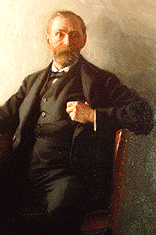October 21: Religion and the Nobel Prizes
Alfred Nobel (1833)
It was on this date, October 21, 1833, that Swedish chemist Alfred Bernhard Nobel was born in Stockholm. It is one of the ironies of his life that a man who made his fortune in the invention and manufacture of weapons of war – dynamite and other nitroglycerine derivatives – bequeathed among five annual prizes one acknowledging efforts toward peace.
Perhaps in Shaw's Major Barbara, the industrialist Undershaft was modeled on Nobel, but the point is that no money is ultimately untainted. When Alfred Nobel died on 10 December 1896, his will stipulated that the interest on his accumulated wealth was to be awarded (by the Nobel Foundation, in consultation with others) for the most important discovery in physics, chemistry, and physiology or medicine, for the best effort to promote world peace, and for the best fiction work of "an idealist tendency."
In Swedish the expression is i idealisk riktning, but the supposed idealism has been oddly interpreted over the years. Many novelists unknown outside their own countries have won the prize for literature, while many novelists of an idealist but Rationalist tendency have been passed over, such as H.G. Wells, Joseph Conrad, Émile Zola, Gabriele D'Annunzio, George Santayana, Maxim Gorki, Leo Tolstoy, and Upton Sinclair, among others. Nevertheless, we have such religious skeptics as winners as Bjørnstjerne Bjørnson, Anatole France, John Galsworthy, Sinclair Lewis, Maurice Maeterlinck, Theodor Mommsen, Eugene O'Neill, Luigi Pirandello, Romain Rolland, G.B. Shaw, Rabindranath Tagore, William Butler Yeats, Bertrand Russell, José Saramago, Dario Fo, Nadine Gordimer, Claude Simon, Jean-Paul Sartre, Albert Camus, and Ernest Hemingway.
The Nobel judges are most likely conventionally Christian themselves, and they have a tendency to favor smaller countries and to be influenced by political considerations when awarding prizes. In spite of this, however, if a thorough study were to be undertaken into the religious beliefs of Nobel recipients since the first prize was awarded in 1901, five years after their namesake's death, you might find less that 30% of the scientists were conventionally religious (and most likely Atheist) – with only a handful fit to be claimed by the Catholic Encyclopedia – while, of the recipients in literature and humanitarian work, less than half would fall into the Christian column.
And this raises the question: of what inspiration is religion in general, and Christianity in particular, to humanitarian, literary and scientific achievement? It goes without saying that Nobel winners from Muslim countries are as rare as votes for women there. There is simply no way around it: at the very least, lack of religious belief is no impediment to standing in the front rank of benefactors of humanity.
Nobel's friend and former secretary, Bertha von Suttner (a Rationalist), was influential in persuading Nobel to designate one award for peace, and here the recipients are decidedly skewed toward the questionable – such as Elihu Root, Theodore Roosevelt, Austen Chamberlain, Arthur Henderson, Charles Gates Dawes, Kofi Annan, Willy Brandt, Dag Hammarskjöld, George C. Marshall, Henry Kissinger, Mother Teresa, Yasser Arafat, Barack Obama, professional diplomats or paid officials at the UN – people whose official capacity and professional staffs made their work an expectation rather than an example. And yet the peace category is populated with a higher percentage of religious skeptics than can be found in the world at large!
Returning to Nobel's stipulation of idealism, however, it is interesting to note that Alfred Nobel once tried his hand as a playwright, with the result being an obscure play called Nemesis. Nemesis was based on The Cenci, a blank verse tragedy by Percy Bysshe Shelley, whose Atheism was well known. It is at least plausible that Nobel's idea of idealism in literature and humanitarian work might instead have favored those who fight for their ideals against such authorities as God, Church, and State.
Just a thought.
Originally published October 2003 by Ronald Bruce Meyer.


